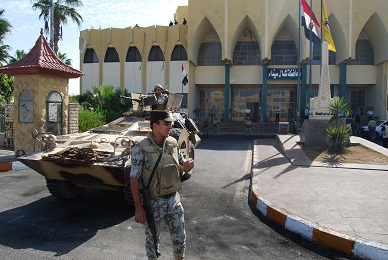“Egypt does not conspire against any country and does not interfere in the internal relations of any country, especially Sudan”, President Abdel Fattah Al-Sisi said during a press conference with Austrian chancellor Christian Kern on Wednesday.
Egypt rejected the Sudanese accusations of supporting the armed groups in Darfur in western Sudan, and asserted its respect for the sovereignty of Sudan over its territories. Egypt’s Ministry of Foreign Affairs spokesperson, Ahmed Abu Zaid, said on Tuesday that Egypt had never and would never interfere to destabilise the security of Sudan or harm its people.
Abu Zaid stressed that Egypt’s foreign policy is based on respecting the international law and neighbourly relations, and is non-aggressive, especially when dealing with countries with which Egypt has special fraternal relations, such as its brotherly neighbour Sudan.
Egypt was supporting the unity of Sudan and exerted efforts to keep the unity option the most attractive option for the South Sudanese people before the independence, Abu Zaid added.
Abu Zaid regretted the Sudanese position despite Egypt’s support to Sudan in international forums, and Egypt employed its diplomacy over 15 years to protect Sudan from foreign interferences or imposing sanctions on Sudanese officials.
He also added that Egypt has participated in all peace negotiations between the Sudanese government and rebels in Darfur. Also, Egypt has units in the peacekeeping forces to boost peace and stability in Darfur, according to Abu Zaid.
Sudanese president Omar Al-Bashir accused Egypt of supporting the armed groups in Darfur in western Sudan. In his speech before the attendants of the ceremony of retired army officers in the ministry of defence on Tuesday, Al-Bashir added that the army and the Rapid Support Forces (RSF) have seized Egyptian armoured vehicles used by the Darfur rebels in their attack last Friday on the two states.
On Friday, fierce clashes erupted in North and East Darfur between Sudanese forces and the Sudan Liberation Movement-Minni Minnawi (SLM-MM) and the SLM-Transitional Council, a splinter group from the SLM-Abdel Wahid. These rebellious movements recently entered Darfur from Libya and South Sudan, according to Sudanese media.
However, Sudan fought alongside Egypt during its 1967 and 1973 wars against Israel, but Egypt did not support Sudan in its war against rebels, which lasted for 20 years—not even with a single bullet—Al-Bashir stated.
Al-Bashir’s statements come just hours after his envoy for diplomatic contact and negotiation for Darfur, Amin Hassan Omer, hinted to Egypt’s involvement in the attacks, which he said were meant to delay the permanent lifting of US sanctions imposed on Sudan.
Relations between Egypt and Sudan have been strained since 1995, after the assassination attempt on the life of then-Egyptian president Hosni Mubarak in the Ethiopian capital, Addis Ababa, which Egypt accused Sudan’s government of facilitating.
Also, relations between Cairo and Khartoum have suffered since July 2013, when former president Mohamed Morsi was ousted from power. In the past couple of years, multiple other issues have amplified tensions between the two countries.
The Sudanese regime used to give aggressive speeches against Egypt to distract from its internal problems, Hany Raslan, an expert on African countries’ affairs at the Ahram Centre for Political and Strategic Studies (ACPSS), told Daily News Egypt.



